|
|
|
Sort Order |
|
|
|
Items / Page
|
|
|
|
|
|
|
| Srl | Item |
| 1 |
ID:
126959
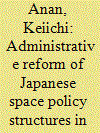

|
|
|
|
|
| Publication |
2013.
|
| Summary/Abstract |
In Japan, there are several government ministries and agencies with important roles in the development and use of space. In 2012, Japan restructured its administrative organs related to the development and use of space through legal amendments to the original acts that established these organs. Although this was an important administrative reform that took four years of planning and discussion to accomplish, this restructuring has not been communicated well outside of Japan. This study provides the first comprehensive overview of the recent legal changes in Japanese space policy. In contrast to some reports, the Ministry of Education, Culture, Sports, Science and Technology (MEXT) still has primary responsibility for the finances and personnel of the Japan Aerospace Exploration Agency (JAXA). This continues to be true even after the Cabinet Office begins its new role as the focal point for formulating Japanese space policy. It remains to be seen how the policy direction of the Cabinet Office will interact with the operational, financial, and personnel responsibilities of MEXT. I argue that knowledge of the roles of MEXT and the Cabinet Office in space policy, and the tension between the two organizations, is key to understanding Japan's future space policy decision-making process. By tracing the history of Japanese space policy since 2001, I also suggest that if bureaucrats had thought more deeply before making major reforms to space policy and its administration, there would have been less confusion over the development of national space policy this past decade. This paper concludes by identifying some key elements to monitor in the coming years of Japan's space policy.
|
|
|
|
|
|
|
|
|
|
|
|
|
|
|
|
| 2 |
ID:
130046


|
|
|
|
|
| Publication |
2014.
|
| Summary/Abstract |
At the beginning of the space age, the United States relied upon the general acceptance of a sanctuary narrative of outer space in order to help support its reconnaissance activities over the Soviet Union. The notion that space could be a sanctuary thus served as a diplomatic tactic, one designed to thwart Soviet opposition to American overflight. While the Soviets eventually achieved parity-having later acquired the ability to surveil the United States-the notion of sanctuary became untenable once the Soviet Union began to further leverage space power for the aim of attacking American satellites and naval assets. The crucial moment, as revealed in recently declassified documents, occurred in 1976 when the Ford Administration recognized the need for an American anti-satellite capability. Subsequently, while the Carter Administration appeared to pursue comprehensive space arms control, what was really in play was a gambit, one designed to eliminate the Soviet's co-orbital anti-satellite capability and maintain strategic parity in space.
|
|
|
|
|
|
|
|
|
|
|
|
|
|
|
|
| 3 |
ID:
132561
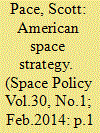

|
|
|
|
|
| Publication |
2014.
|
| Summary/Abstract |
This Viewpoint addresses American space strategy and the choices that lie before US space practitioners. Space activities today play critical roles in U.S. national security, economic growth, and scientific achievements. Satellite communications link the world. The Global Positioning System (GPS) is an integral part of several critical infrastructures, and enables functions ranging from survey and construction, to farming, finance, and air traffic management e not to mention US military forces worldwide. Less well understood is how the GPS time signal provides a global time base for encrypted communications e including point-of-sale transactions with credit or debit cards. Without GPS, much of today's economy would come to a halt. Beyond the Earth, we have rovers on the surface of Mars, and a probe that has left the solar system. The International Space Station represents a unique collaborative
partnership between the United States, Europe, Canada, Japan, and Russia. Spacefaring states are concerned with the long-term sustainability and security of space activities as a result of increasing orbital debris and the proliferation of space capabilities of new national entrants, some of them potential adversaries.
|
|
|
|
|
|
|
|
|
|
|
|
|
|
|
|
| 4 |
ID:
139176
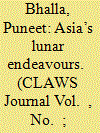

|
|
|
|
|
| Summary/Abstract |
Interest in the exploration of the Moon, much like its phases, has waxed and waned since the beginning of space exploration. The quest for the Moon was an integral part of the space race between the Soviets and the Americans in the 1960s and 1970s, which resulted in a total of 65 missions, including the six manned missions by the US, before they both shifted focus to manned space stations and missions to Mars. Strategically or militarily, the Moon did not offer them much advantage. Scientifically, there was not much that was expected to be revealed after the first few missions. Economically, there was no great rationale for continuing a high cost programme from which few commercial gains could be expected at the time. Mars offered more opportunities for national prestige, scientific discovery as well as mining prospects. In the next few decades, although there were periodic statements about the potential of lunar exploration, these did not translate into actual efforts by any space-faring nation.
|
|
|
|
|
|
|
|
|
|
|
|
|
|
|
|
| 5 |
ID:
193568
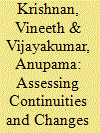

|
|
|
|
|
| Summary/Abstract |
Japan announced its new space security blueprint in June 2023. The new blueprint lays down a ten-year roadmap for the country to enhance the utilization of space for its military. While the announcement has been widely perceived as a ‘first’, it is in fact a crystallization of Japan’s space security strategies over the last few decades. This article interprets the blueprint in light of Japan’s counterstrike doctrine. It traces Japan’s rise as a military space power since the 1970s and analyses its evolving approach to space security. Continuities and changes in the 2023 blueprint are assessed against Japan’s historic policies.
|
|
|
|
|
|
|
|
|
|
|
|
|
|
|
|
| 6 |
ID:
130048
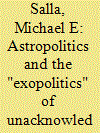

|
|
|
|
|
| Publication |
2014.
|
| Summary/Abstract |
The role of unacknowledged classified programs remains an enigma for fully understanding activities in space and the study of astropolitics. Classified programs by law are not publicly announced, and remain inaccessible to all except those with valid security clearances to be briefed about them. In the United States, waived Unacknowledged Special Access Programs are the most highly classified programs conducted by the military and intelligence community. The same classification protocols are also required of private contractors working with U.S. military departments and intelligence agencies on classified programs. As space continues to grow in its national security significance, the number of these unacknowledged programs pertaining to space is likely to grow significantly from its current number. This requires adopting the necessary conceptual tools and methodological flexibility for investigating unacknowledged activities in space. This also extends to evidence concerning unidentified flying objects and extraterrestrial life. This article suggests that "exopolitics" is a unique multidisciplinary approach to extraterrestrial life that offers a helpful set of conceptual tools for studying unacknowledged space activities, and complements the field of astropolitics.
|
|
|
|
|
|
|
|
|
|
|
|
|
|
|
|
| 7 |
ID:
113041
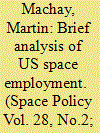

|
|
|
|
|
| Publication |
2012.
|
| Summary/Abstract |
Space policy is an area of industrial economic policy. The space economy would vanish without the active role of the state. Although space may appear exotic to economist, it is not impossible to provide a quick economic insight into one of the most important aspects of all economic activities - the people employed. The space industry can attract employees from other industries in two ways. First, according to individual preferences and motivations. Second, on the basis of higher wages. Statistical evidence suggests the latter is more common. Moreover wages do not reflect productivity. NASA employees earn much more than employees in law or medicine. This does not match the social importance of these activities. Space employs many more people that stated by the OECD. Taking all activities together space employs almost half a million people in the USA. $1 billion given to NASA creates up to 24 000 vacancies in the space industry and also provides room for another 40 000 in the space economy in the long run. Current changes to the US national space programme suggest a decrease of $1.6 billion per year, implying a loss of up to 39 000 jobs.
|
|
|
|
|
|
|
|
|
|
|
|
|
|
|
|
| 8 |
ID:
130045
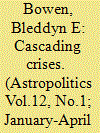

|
|
|
|
|
| Publication |
2014.
|
| Summary/Abstract |
The term space security is often used, but seldom analyzed. This is a significant gap in the literature of space politics, as it posits considerable implications for debates on how to deal with a runaway growth in the space debris population, and how we argue for or against space weaponization. Securitizing all threats in space may lead to greater difficulties in enacting debris removal measures, as these systems are inherently dual-use. A case is made for keeping space security in its traditional connotations of national security so that environmental issues related to orbital debris can be resolved with reduced security concerns in a space development framing.
|
|
|
|
|
|
|
|
|
|
|
|
|
|
|
|
| 9 |
ID:
061962


|
|
|
| 10 |
ID:
105510
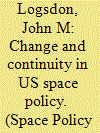

|
|
|
|
|
| Publication |
2011.
|
| Summary/Abstract |
2010 saw both the unveiling of a new US National Space Policy and the announcement of a fundamentally different strategy for US human spaceflight that would move from the NASA-government-led Apollo-style approach to a greater reliance on the private sector and international cooperation. This viewpoint puts forward arguments on why change in the US approach to human spaceflight is needed, while acknowledging that achieving it in the face of vested interests and threats to jobs and livelihoods is extremely difficult. It suggests that greater US recognition of the need to ensure the sustainability of space activity (by addressing debris, radio-frequency interference and potential deliberate disruption of spacecraft), and an apparent willingness to countenance international norms to govern space activities, could be the new policy's most lasting heritage.
|
|
|
|
|
|
|
|
|
|
|
|
|
|
|
|
| 11 |
ID:
082539
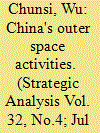

|
|
|
|
|
| Publication |
2008.
|
| Summary/Abstract |
One important feature of China's outer space policy is to carry out cooperation with all countries. In the cooperation, China pays great attention to the rights and demands of developing countries in the high-technology area. With more actors in outer space, it is necessary and urgent to improve the existing legal system regulating the relations of countries and non-state actors. China's attitude to outer space activities is driven by both domestic and international elements. Development, defence, and technological innovation are the three major goals of China's outer space programmes
|
|
|
|
|
|
|
|
|
|
|
|
|
|
|
|
| 12 |
ID:
082538
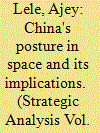

|
|
|
|
|
| Publication |
2008.
|
| Summary/Abstract |
As part of its peaceful rise strategy, China has made resolute investments in the field of science and technology. One major aspect of this technological quest has been its investments in space technologies. China's success in this field is remarkable and has brought glory to the nation. However, at the same time, the anti-satellite test (ASAT) undertaken by China, during January 2007, has raised the fears of the weaponization of space. This article examines the developments in China's space programme and attempts to analyse its impact on the global space architecture in general and on India in particular.
|
|
|
|
|
|
|
|
|
|
|
|
|
|
|
|
| 13 |
ID:
078712
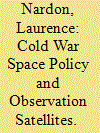

|
|
|
|
|
| Publication |
2007.
|
| Summary/Abstract |
Constellations of observation satellites resemble the "Panopticon" system imagined by British philosopher Jeremy Bentham in his 18th century project for an ideal jailhouse - a system that Michel Foucault analyzed in Discipline and Punish (1975). Just as the warden in the central tower watches the prisoners without their being able to see him, satellites watch the Earth while observed countries cannot escape or monitor the extent of the observation.
Will observed countries factor in the control exerted by observing countries, just as prisoners will eventually interiorize the warden's discipline? This may indeed have been the goal of the U.S. satellite observation policy during the Cold War (1950's-1980's). The U.S. at the time sought to exert a new form of power on the international scene, resorting to persuasion and deterrence rather than all-out aggression.
U.S. satellite surveillance was at work vis-a-vis the USSR through different policies linked to nuclear deterrence; and vis-a-vis U.S. Allies (NATO, Great-Britain, France and Israel), then subject to a U.S. information monopoly. The intended panoptical power was not totally efficient, however. Regarding the USSR, its exercise depended ultimately on the political climate between the two Superpowers. Allied countries succeeded repeatedly in warding off U.S. attempts at control through information
|
|
|
|
|
|
|
|
|
|
|
|
|
|
|
|
| 14 |
ID:
053385


|
|
|
|
|
| Publication |
Autumn 2004.
|
| Summary/Abstract |
In central and eastern Europe, symbiosis between particular ethnic-cultural nations and territorial areas is understood as corresponding to a natural and moral order. European Union enlargement challenges this mindset by legally transforming ‘national territory’ into ‘supranational’ real property or even opening the possibility of restitution claims by ‘foreigners’. In the Polish and Czech cases this is highly contentious, principally due to the prospect of Germans and/or Austrians obtaining land. Rather than representing prosaic exchange among neutral economic agents the issue is embroiled in a complex of political and emotive influences, with historical roots that run deeper than the communist era. Realisation of a common European legal order is accompanied and to some extent hindered by misgivings about a liberal space of free access, unrestricted capital movement and no discrimination on grounds of nationality.
|
|
|
|
|
|
|
|
|
|
|
|
|
|
|
|
| 15 |
ID:
130177
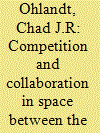

|
|
|
|
|
| Publication |
2014.
|
| Summary/Abstract |
U.S. national security space policy has recently shifted significantly toward increased international cooperation. Australian space activities have been reinvigorated, but remain underfunded. China's space activities remain vigorous, but largely unilateral. Given U.S. policy changes, opportunities for cooperation and collaboration among all three have improved.
|
|
|
|
|
|
|
|
|
|
|
|
|
|
|
|
| 16 |
ID:
131039
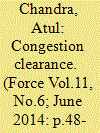

|
|
|
|
|
| Publication |
2014.
|
| Summary/Abstract |
India's growing civil aviation sector now has an increasing number of scheduled, non-scheduled airlines, flying institutes and private-use aircraft that will require a larger number of airports and airfields to enable air connectivity across all corners of the country.
The Airports Authority of India (AAI) had already begun work on 50 low-cost airports, located in remote and interior areas of the country. In addition to this greenfield airports at Navi Mumbai, Goa, Kannur and Kushinagar, AAI has identified six airports for private management under the Public Private Partnership (PPP) route following the successful implementation of PPP models in Delhi, Mumbai, Bengaluru, Hyderabad and Cochin.
All these measure will not only lead to more airports but also increased utilisation of existing airports, thus helping to increase air traffic but at the same time putting additional pressure on airspace management. In another recent move, the government allowed flexi use of airspace by civil and military users on a sharing basis, which will enable the available airspace to be used in a more optimised and effective manner.
|
|
|
|
|
|
|
|
|
|
|
|
|
|
|
|
| 17 |
ID:
157175
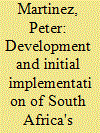

|
|
|
|
|
| Summary/Abstract |
South Africa is one of the few countries in Africa that has codified a national space policy. South Africa's first public national space policy was adopted in 2009. The policy has given direction and purpose to the country's recent space activities. Prior to this, space activities in South Africa were disparate and uncoordinated. Because space policy is not a primary policy issue, but rather an ancillary policy issue, the development of space policy had to be couched in terms that made it clear to policymakers exactly how space activities would contribute to national development and other policy priorities. This required building capacity in government to engage in policy discussions around these issues. We describe the process that was followed to raise the political profile of space affairs to the point that it became a policy issue for the South African government. The policy development narrative is arranged in a series of ten goals that were addressed during the policy development process. These goals speak to how one can address the political and systemic challenges of space policy formulation in the context of an emerging space nation that is also a developing country. The goals may thus be of interest to other emerging space nations at a similar stage in their development.
|
|
|
|
|
|
|
|
|
|
|
|
|
|
|
|
| 18 |
ID:
120654
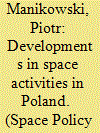

|
|
|
|
|
| Publication |
2013.
|
| Summary/Abstract |
Poland has a long-standing tradition in space activities. Polish institutions have participated as co-investigators in almost all European Space Agency (ESA) science projects, as well as on many other missions. However, the first Polish satellite (PW-SAT) was only launched in 2012. Poland was one of the first Eastern European countries to conclude a Cooperation Agreement with ESA in the peaceful use of outer space; it was signed in 1994 and followed by a second in January 2002. Negotiations on Polish membership in the ESA were started in autumn of 2011, and ended in April 2012. Following ratification of the agreement, Poland officially became the 20th Member State of ESA on 19 November 2012. This article examines how Poland is setting its way as a space nation. It describes recent developments in the Polish space programme, including the road to Poland's full membership in the European Space Agency.
|
|
|
|
|
|
|
|
|
|
|
|
|
|
|
|
| 19 |
ID:
101223
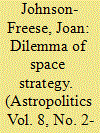

|
|
|
| 20 |
ID:
127501
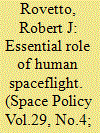

|
|
|
|
|
| Publication |
2013.
|
| Summary/Abstract |
The question is: should the United States and nations at large pursue a human spaceflight program (and if so, why)? I offer an unwavering positive answer to this question, and state the reasons for it while considering the broad challenges and benefits of (human) spaceflight. Space exploration is a human activity that is intrinsically forward-looking, and as such, has positive potential. Both national and international space programs can galvanize the population, inspire the youth, foster job-creation, and motivate the existing workforce. The nature of the enterprises involved-their scale, novelty, and complexity-requires a steady and continuous upward progression toward greater societal, scientific and technological development. That is, in order to overcome the challenges of human spaceflight, progress is required. More to the point, the survival of humanity depends on expanding beyond the confines of our planet. Human spaceflight, in short, presents us with an opportunity to significantly advance the nation and the global community.
|
|
|
|
|
|
|
|
|
|
|
|
|
|
|
|
|
|
|
|
|